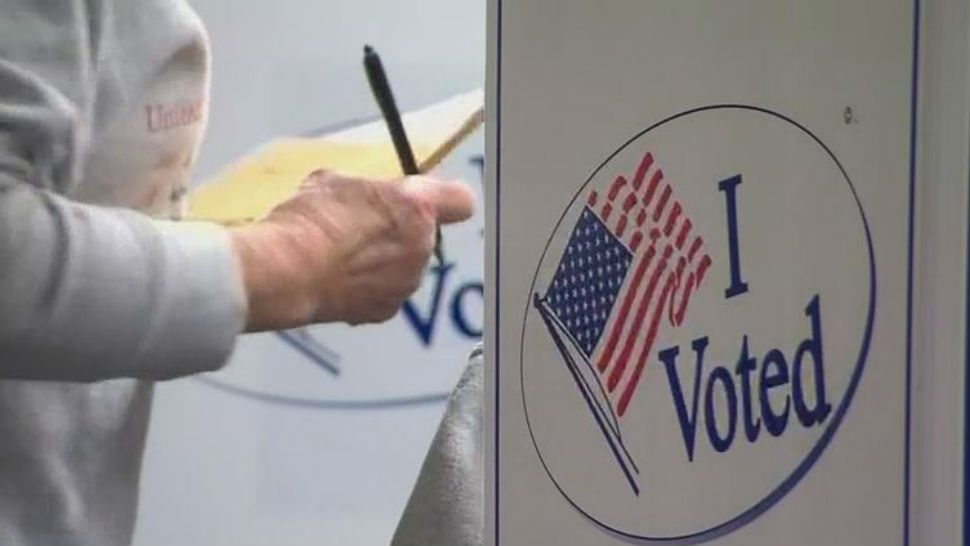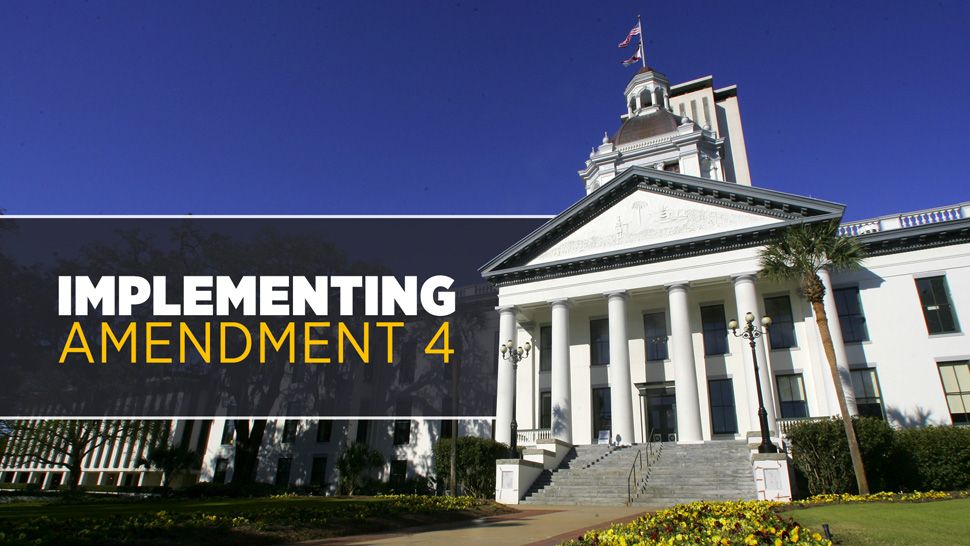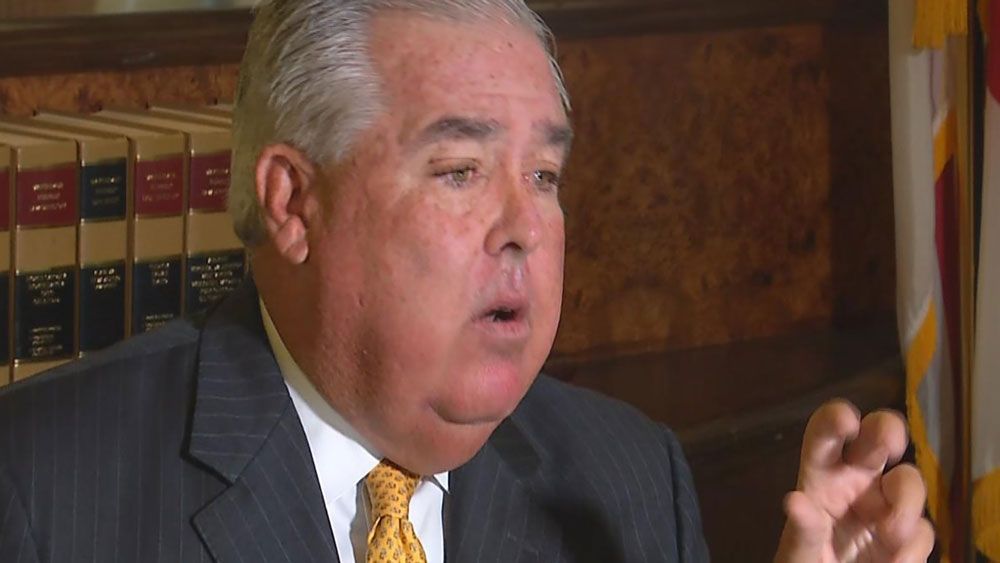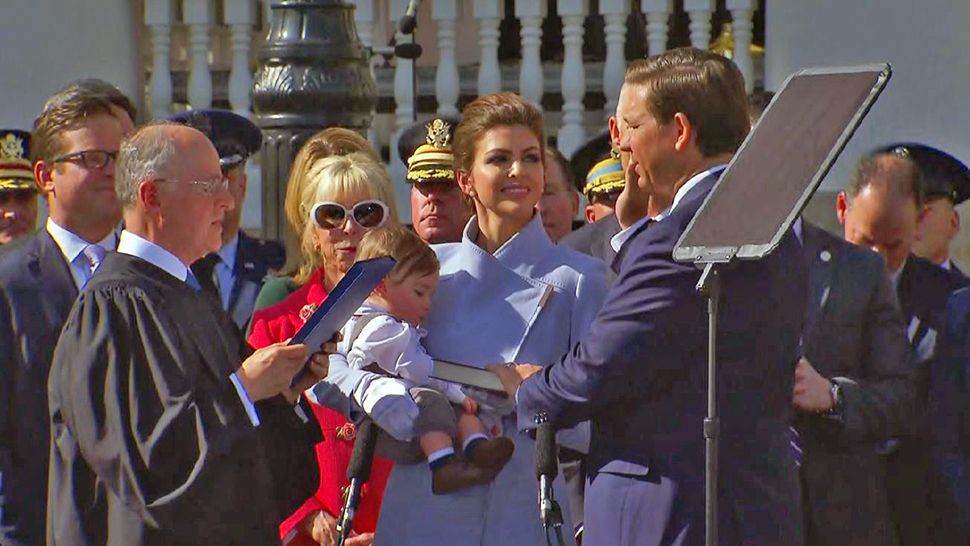ORLANDO, Fla. — Florida voters approved 11 of 12 amendments to the Florida Constitution, including measures that restore voting rights to certain felons, and a ban on greyhound racing.
One amendment, Amendment 1, failed to pass the 60 percent voter threshhold. The amendment would have created a third homestead exemption for people with taxable value of $100,000 to $125,000.
- LIVE ELECTION RESULTS: National, state, local races, plus all ballot issues ▼
- JUMP TO: Up-to-the-minute updates from our Spectrum News crews ▼
- FULL COVERAGE ON:
Voters approved the following amendments:
Amendment 2:
Makes a cap on property value increases for non-homestead properties permanent.
Amendment 3:
Takes casino gambling decisions away from the Florida legislature and puts it in the hands of voters through citizen initiatives.
Amendment 4:
Restores voting rights automatically once felons complete their sentences. Does not apply to felons convicted of murder or sex crimes.
Amendment 5:
Requires a supermajority in the Florida House and Senate in order to pass new taxes or raise taxes and fees.
Amendment 6:
Expands the rights of victims in criminal cases, deletes a provision that says the rights of victims should not interfere with the rights of the accused.
Amendment 7:
A bundled amendment that includes changes for state universities and colleges. It also requires state and local governments to pay death benefits for first responders, and the state to pay death benefits to members of the military who are either stationed in Florida, or are residents of the state.
Amendment 9:
A bundled amendment that bans offshore drilling for oil and gas in Florida waters, and adds electronic cigarettes and vaping to the state indoor smoking ban.
Amendment 10:
A bundled amendment that forces counties to keep 5 constitutional officers, plus requires Florida to have a Dept. of Veterans Affairs and an office of counterterrorism within the FDLE.
Amendment 11:
Bundled amendment that removes some older language from the Florida Constitution.
Amendment 12:
Expands lobbying restrictions for state and local elected officials, public employees and judges.
Amendment 13:
Amendment phases out commercial dog racing in Florida by 2021.
The amendments were a mix of state legislature initiatives, citizen initiatives and amendments approved by the Florida Constitution Revision Commission, a panel that meets every 20 years to add new amendments to the ballot.
Some of the Florida CRC's amendments were bundled, containing multiple issues, which in some cases weren't even related to each other — Amendment 9, for instance, bans offshore drilling and vaping indoors. The CRC said it was trying to get more issues considered without making the ballot longer.
For each amendment to pass, 60 percent of voters must approve the amendment. And even after an amendment passes, the legislature needs to write an implementation bill for it.
Here's a closer look at each of the amendments*:
- Amendment 1 ▼
- Amendment 2 ▼
- Amendment 3 ▼
- Amendment 4 ▼
- Amendment 5 ▼
- Amendment 6 ▼
- Amendment 7 ▼
- Amendment 9 ▼
- Amendment 10 ▼
- Amendment 11 ▼
- Amendment 12 ▼
- Amendment 13 ▼
* There is no Amendment 8 because the Florida Supreme Court threw it off the ballot for being deceptive.
Want to learn more? You can check out the Florida Amendments section in our Decision 2018 Voting Guide.
Amendment 1 creates a new homestead exemption that applies to homes with a taxable value between $100,000 and $125,000. It applies only to non-school tax rates. While it may save homeowners a few hundred dollars a year, an analysis by the Florida Legislature's staff, which put the amendment on the ballot, found it would cost local governments about $645 million in the first year if approved. The legislature has already passed a bill to help poorer counties that would be burdened by this amendment with out of state funds.
Florida County Property Appraisers created an app that shows you whether your home will benefit from the Amendment 1 exemption. Most Florida counties are included in this app (Orange County is not). Try the app to see if you will benefit.
Since 2008, Florida has capped property value increases on non-homestead properties, to keep tax rates down. Currently, those property value increases cannot go up by more than 10 percent each year. Those properties could be businesses, they could be shopping centers, they could be apartment complexes, they could be vacation rentals.
But this cap is scheduled to automatically end next January. Amendment 2 makes the cap permanent.
If you are pro-gambling, Amendment 3 may sound like a great idea. It takes decisions on casino gambling out of the hands of the Florida legislature, where efforts to expand gambling have repeatedly failed, and puts it in the hands of the people. But, the devil is in the details.
Amendment 3 would require that any effort related to gambling would have to be done through a citizen's initiative (which, by the way, is what Amendment 3 is). A citizen's initiative can only get on the ballot if it gets a minimum number of petition signatures that's based on the number of votes in the last presidential election (currently 766,200), spread out over at least half of Florida's 27 Congressional Districts.
This means if a group in the panhandle wants to bring a casino to Pensacola, it needs to get 766,200 signatures from Floridians all over the state. Then the amendment goes on an election ballot and must be approved by 60 percent of all Florida voters.
Efforts to bring gambling to other areas of Florida have met with heavy opposition in the past. Two groups that have poured millions into the "Yes on 3" campaign are Walt Disney World and the Seminole Tribe. Supporting efforts to stop the amendment are South Florida race tracks who fear losing the ability to expand their casino operations.
Amendment 4 is one we will watch closely on Election Day because its passage could be transformative.
This citizen's initiative would grant automatic voting rights restoration to felons that have completed their sentences. Felons convicted of murder or sex crimes would not be included in this.
It's estimated that 1.5 million Floridians could have their rights restored if this amendment passes. They come from all walks of life, according to clemency experts.
Currently, felons have to wait 5 to 7 years before they go before a clemency board, which is the Florida Cabinet, to ask for their voting rights to be restored. There is no criteria for the cabinet to decide whose rights get restored and whose don't. There is also a backlog of people waiting for their chance to plead for their rights.
Right now, the Florida Legislature needs just a simple majority to raise or impose any new taxes or fees. This amendment would make it so the legislature would need the votes of 80 people in the Florida House out of 120 members, and 27 in the Florida Senate out of 40 members to pass that bill.
The amendment does not apply to the corporate income tax or any fees or taxes imposed by local governments or schools.
Amendment 6 is the first of the "bundled" amendments added to the ballot by the Florida Constitution Revision Commission. The amendment brings parts of a victims' rights bill called "Marsy's Law" to Florida's constitution, which would expand victims' rights.
Where it becomes controversial is that it also removes a provision that says the rights of the victim should not interfere with the rights of the accused. Critics also say that many of the victims' rights that come under the amendment are already in the Florida Constitution.
The amendment also would raise the retirement age for Florida judges and justices to 75 (it's currently 70), and it would ban a judge from using a state agency's interpretation of a law in deciding a case.
Amendment 7 is another bundled measure that includes multiple provisions that focus on different issues.
The measure makes changes to Florida's public colleges and universities in the constitution. It adds a basic governing structure for state colleges. It also requires that if any university wants to create new student fees or hike new fees, it must have a two-thirds majority of votes in the Board of Trustees.
The amendment also requires family members of first responders killed in the line of duty get death and education benefits from state and local government. The amendment would benefit:
- Firefighters
- Paramedics
- Emergency medical technicians
- Law enforcement
- Correctional or correctional probation officers
The amendment also requires the state to provide death benefits for active duty members of the Florida National Guard or the U.S. Armed Forces if they are residents of the state or are serving in Florida at the time of their death.
Family members are already supposed to get a death benefit through the federal government.
This is the bundled amendment that bans oil and gas drilling in state waters, and adds vaping or e-cigarettes to the state's indoor smoking ban, which is in the Florida Constitution.
It was brought to the ballot by the Florida Constitution Revision Commission.
In many Florida counties, voters elect a sheriff, property appraiser, supervisor of elections, clerk of circuit court, and tax collector. They are mostly autonomous, with their own staffs and budgets.
But in some counties, voters have changed their charters so that those positions are different. They may be merged with other positions; they may be county-appointed; their budgets may have to be approved by a county manager before going to the county commission.
This amendment makes the five positions above constitutional positions that must be directly-elected by voters. It also overturns those counties that changed their charters.
Volusia, Broward, and Miami-Dade counties all tried to stop this amendment from getting on the ballot because it would change their charters.
Amendment 10 is also a bundled amendment. Its other provisions force the Florida Legislature to always have a Dept. of Veterans' Affairs, and to set up an Office of Domestic Security and Counterterrorism within the Florida Dept. of Law Enforcement.
It also would put a current law into the constitution regarding when Florida legislators meet for their annual session. Under the amendment, in election years, the 60-day legislative session would start in January. This gives lawmakers more time to campaign before primaries.
Think of this as a housekeeping amendment. Amendment 11 deleted several provisions considered obsolete. But it's also a bundled amendment -- it includes a change to the criminal justice system.
- The amendment repeals a provision that allows the Legislature to restrict the property rights of non-citizens.
- It also deletes the language in the constitution regarding high-speed rail that was repealed by voters in 2004. In that case, voters repealed a Florida amendment that required to bring high-speed rail to Florida.
The third measure in the amendment gets rid of language that requires the state to continue to prosecute suspects for a law they're accused of breaking, even if Florida lawmakers change that law while the case is happening.
Amendment 12 expands current Florida rules regarding politicians and state employees becoming lobbyists for groups in Florida.
Currently, state-elected officials have to wait 2 years after leaving office before they can get paid to lobby the legislature. This would expand that to 6 years.
It also expands the requirements for officials in charge of state agencies, all state-elected officials, officials in local offices, and former judges.
The amendment also bans public officers from using their office for "disproportionate benefit." What does that mean? The Florida Commission on Ethics will set those parameters once the amendment is passed.
The final amendment, approved by the Florida Constitution Revision Commission, is another that will be closely watched on Tuesday night.
Amendment 13 phases out greyhound racing for wagers in Florida by 2020.
The amendment allows race tracks to continue to allow off-track betting for races held outside of Florida, but cannot have live racing.
Supporters point to the fact that the sport has a high mortality rate, and the industry has fought attempts to bring more transparency to the industry.
Opponents, however, say the amendment is a ploy by animal rights activists to restrict not just commercial racing, but other dog sports in the state, including things like rally, lure coursing, and even dog shows, all of which are considered official events involving dogs.
Even some greyhound rescue groups are opposed to the amendment, claiming it will lead to the deaths of the greyhounds.







